Les Moulins Mahjoub: creating a one-of-a-kind Southern Mediterranean olive oil, all by hand, with a rich history of Berber tradition
…If you know [the] efforts [that] must be made to achieve an authentic first cold press [olive oil] in its supreme mystery, [then you can] rejoice the soul of the oil master.” —Majid Mahjoub of Les Moulins Mahjoub
There’s no denying it: we live in a technological and mechanized world in which profit is the bottom line. Across the globe, increasing numbers of societies charge toward doing all sorts of things with greater speed and efficiency. And the food industry–including farming, producing and packaging–is no exception.
But at Rogers Collection we have the honor of collaborating with many food producers who operate their businesses in traditional ways with integrity and at a slower pace.
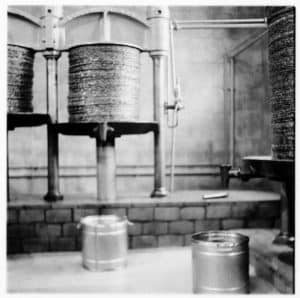 This is true more of no other business than family-run Les Moulins Mahjoub, who has an unparalleled line of Southern Mediterranean products including harissa, sun-dried couscous, olive oil and much, much more. (Visit this Rogers Collection blog for the full fascinating history of this family and their land, complete with video here!)
This is true more of no other business than family-run Les Moulins Mahjoub, who has an unparalleled line of Southern Mediterranean products including harissa, sun-dried couscous, olive oil and much, much more. (Visit this Rogers Collection blog for the full fascinating history of this family and their land, complete with video here!)
Located in Tunisia, North Africa–on the land of the ancient nomadic Berber tribe known for fruit tree cultivation expertise and sun-drying methods of food–Les Moulins Mahjoub honors many of these traditions by growing, harvesting and producing their foods by hand. Most notably is their olive oil. Many olive oils are mechanically picked, pressed and decanted which greatly decreases the quality of the oil. (More on that later!) But Les Moulins Mahjoub stone grinds their fresh Chetoui olives right after harvest as they turn from green to black and then vertically presses the crushed fruit under cold conditions in scourtins, or natural fiber, round pressing mats.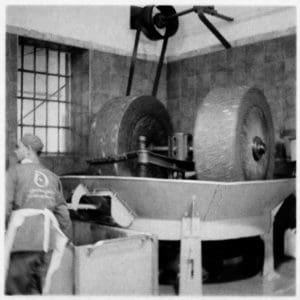
Finally, the oil is hand decanted. After the delicate first cold pressing, rather than introducing the oil to a mechanical centrifuge at speeds of 2,500 r.p.m or more, the oil is hand-decanted by a process called cold static decantation, also known by the softer-sounding à la feuille, or “by foil.” This refers to the foil tool used to gently scoop the oil as it rises to the surface of of the olive water after the crushing and pressing stages. The hand method allows the top layer of oil to be delicately separated from the remaining vegetal water and precipitates. Next, the oil is left to settle and mature until its flavor, aroma and acidity are perfectly balanced.
The ancient à la feuille method dates back to Carthaginian times and can be seen in the stone olive press remnants of the olive oil mill found in the Temple of Jupiter. Majid Mahjoub, who heads promotion and marketing (his two brothers and seven sisters are also integral in the business), says the Temple of Jupiter “is neither the house of the priest, as was the Egyptian temple, nor the house of the people, as will be the cathedral, it is the house of the earth, the symbolic asylum where will be celebrated the riches of the earth: olive oil and wine!”
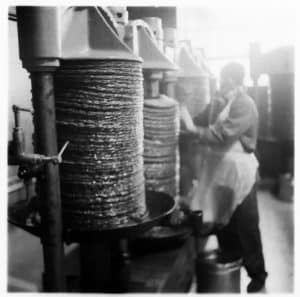 This hand process and the resulting olive oil is truly–and quite literally–divine.
This hand process and the resulting olive oil is truly–and quite literally–divine.
Many years ago, on the family’s farm, Majid’s parents unearthed massive stones from an ancient mill dating back at least 2500 years. Although the mill is no longer in use, the Mahjoub family remains committed to the traditional ways of hand-processing their olives and olive oil.
Even though this hand decantation brings forth a superior-tasting olive oil, surely there are olive oils out there that are decanted by machine, yet still taste good.
Why use this labor-intensive, time-consuming process?
Hand decantation allows for a separation between first and second presses which cannot be achieved with centrifugation.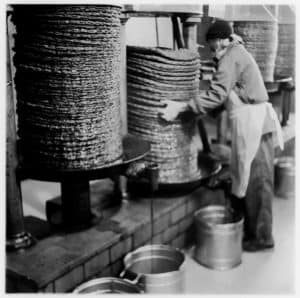
Majid says the distinction between first and second presses, from an organoleptic perspective (in layman’s terms, how does the oil taste, look smell, feel) is extremely important. He says, “I think that we draw more taste and subtlety from separation than from mixing.”
So, that’s the organoleptic distinction: hand decanted olive oil tastes better.
But is there more to it than that? What about integrity? What about preserving Berber tradition in this Southern Mediterranean region? What about slowing down and recognizing that increased volume and speed are not always better?
Why is à la feuille so essential to the olive oil making process for Les Moulins Mahjoub?
Mahjid says, “More to not break the thread of a family daydream. I [do not] hate technical process. My attachment is ancient, and as a symbol…this classic system à la feuille [is] an incredible creative expression in that the oil is set on the gesture and not just the machine. There is a strange intensity of passion in this process [and] an immense talent, but the modern process…sterilizes us [while] à la feuille feels wonderfully the soul of the olive tree.”
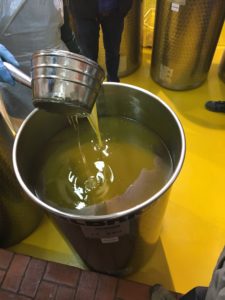 Majid’s poeticism in how he speaks is also present in the Mahjoub family’s philosophy and approach to growing and processing food. The à la feuille process–along with the core principles of Les Moulins Mahjoub–is the antithesis of the profit-over-quality approach we see globally with food production.
Majid’s poeticism in how he speaks is also present in the Mahjoub family’s philosophy and approach to growing and processing food. The à la feuille process–along with the core principles of Les Moulins Mahjoub–is the antithesis of the profit-over-quality approach we see globally with food production.
And you can taste the difference.
What is the difference? Well, in the most literal sense, the difference is a superior-tasting olive oil: delicious, apple-green, vegetal, unfiltered, soft and clean.
But it is more than just those organoleptic distinctions. It’s an olive oil that embodies the rich traditions of the Berber tribe, traditions that the Mahjoubs honor in all of their products.
Even if you don’t consider yourself a lover of poetry, know that the passion of Majid’s words describing their olive oil literally goes into every step of the process of getting that oil into the bottle:
“It is an absolute botanic case, its gustative glamour changes according to various circumstances….experience…an unprecedented exaltation; the early produce, just to be tasted after the harvest.
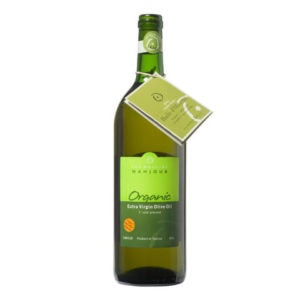 The new early oil produce is a winter tenderness…and its voluptuousness is enjoyed.
The new early oil produce is a winter tenderness…and its voluptuousness is enjoyed.
In Spring, its tone becomes less sharp, softer. Less thick with lavishly generous and fragile substances.
In Summer,…it is lightly clothed…replacing breathing, it moves along, down the throat majestically.”
These are the words of the man, of the family, who pour their passion into their products.
They slow down, they don’t cut corners and the whole process is based in tradition and integrity.
And that is the difference.
Written by Leska Tomash